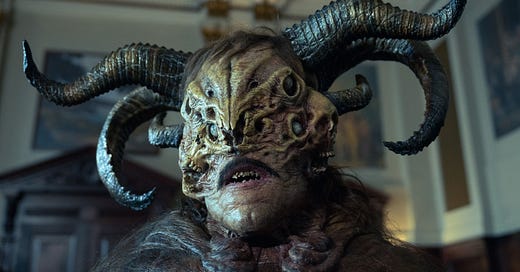Welcome to another Friday newsletter. A bit light this week on things I’ve been consuming, in part because some of what I’ve been consuming will be fodder for future posts and other work I’m doing. Hope you all enjoyed the theatre of the DNC. I mostly avoided the charade, though I caught bits and pieces. I was admittedly entertained by the Lil Jon appearance for Georgia during the roll call. But while Kamala Harris was speaking Thursday night (a speech I watched a few clips from later), I was busy watching the final episode of the best thing on TV.
Evil ended on Thursday. The Paramount+ series created by Robert and Michelle King was been, since it began in 2019, one of the best shows on television—par for the course when it comes to the two best TV creators in the business. I recommended the show in this column just a couple weeks ago, but now that it’s over—cancelled by the corporate goons at the network—I’d like to add some more thoughts about what the Kings were able to accomplish.
For those who don’t already know Evil, it’s about an unlikely trio—a priest, a psychologist, and an atheist tech computer wiz—hired by the Catholic Church to be “assessors,” determining whether or not possible cases of demonic possession are real and require exorcism or other intervention. It began in a little more of the X-Files space, with a weekly focus on the horror of it all, and it often was an incredibly scary show. As it progressed, though, Evil indulged its kookier sensibilities. Anyone who’s trucked with The Good Wife, or The Good Fight, or BrainDead, will recognize this as a hallmark of the Kings’ work. There are simply no other TV writers quite like them, utterly unafraid of the silliest, weirdest ideas, and unbothered by the idea that tone should be consistent or even easily legible.
Evil is a show that will have a character have a truly frightening experience with an evil presence, follow it up with the steamiest scene you can imagine between a hot priest and the woman he lusts after, follow that up with a heartbreaking moment between family members, and then throw in the goofiest shit you’ve ever seen about like a farting demon and the nun trying to kill him. Somewhere in all of that madness and high entertainment, the Kings unearth very real emotions and trenchant insights into the nature of the soul and its place in a modernizing, politically insane world.
The stars of the show are all excellent. Katja Herbers, Mike Colter, and Aasif Mandvi in the lead roles. Andrea Martin, Kurt Fuller, Christine Lahti, Wallace Shawn, and others fill out the supporting cast impeccably. And then there’s Michael Emerson, who appears to be having the most fun any actor has ever had playing a role in the history of humanity, as the evil, maniacal, hilarious and pathetic Leland Townsend.
The last four episodes of Evil feel like a truncated season, which is what they are—added to the original ten-episode order for season 4 after the network decided to end the show, despite its status as one of the ten most-streamed TV shows. The final episode was, in its way, perfect. Burning through plot too quickly to allow it to feel as momentous as it probably deserved, but somehow perfectly in keeping with the Kings’ tendency to eschew pompousness and “prestige.” It’s also quite clear from the way they leave things that they want to make more, and we should all be praying to the gods of television that they be allowed to.
Reading, Watching, Listening
Ta-Nehisi Coates, writing in Vanity Fair, addresses the great elephant in the room at the Democratic National Convention this week: the lack of a Palestinian voice, who could speak to the absolute horror of Israel’s genocidal assault on the people of Gaza since Hamas’s attack on Oct. 7 last year. Coates has mostly abandoned journalistic writing of late, but here and there he’s emerged to deliver essential work, and this piece is no exception. This is a person who had, at one point, admiration for Israel. An admiration which was extinguished when he finally visited the country and the West Bank and witnessed Israel’s inhumanity toward Palestinians first-hand. At the DNC, no Palestinian-American was allowed to speak, despite the movement of Uncommitted delegates negotiating and agreeing to have a fully vetted speech endorsing Kamala Harris. Even the most anodyne representation of Palestinian personhood was unacceptable to the party, apparently. “The ostensible triumph over that old system, which we call Jim Crow, is one of the most uplifting stories America tells itself, one that has been repeatedly invoked at the DNC. How odd I find it that a people, presently brutalized by a similar system, whose relatives are being erased by that system’s wanton violence, are also being erased from the stage,” Coates writes at the end of his compelling piece of opinion and reportage. Odd, perhaps, but unfortunately entirely expected, and expectedly depressing.




